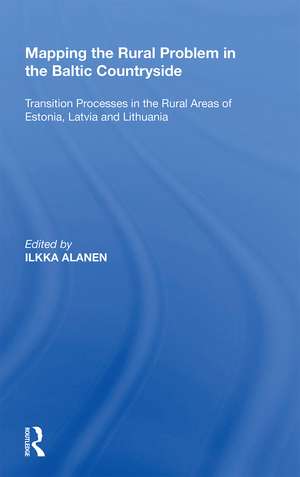Mapping the Rural Problem in the Baltic Countryside: Transition Processes in the Rural Areas of Estonia, Latvia and Lithuania
Editat de Ilkka Alanenen Limba Engleză Paperback – 28 feb 2022
Preț: 190.17 lei
Preț vechi: 230.42 lei
-17% Nou
Puncte Express: 285
Preț estimativ în valută:
36.39€ • 38.07$ • 30.23£
36.39€ • 38.07$ • 30.23£
Carte tipărită la comandă
Livrare economică 02-16 aprilie
Preluare comenzi: 021 569.72.76
Specificații
ISBN-13: 9781138356474
ISBN-10: 1138356476
Pagini: 296
Dimensiuni: 152 x 229 x 20 mm
Greutate: 0.42 kg
Ediția:1
Editura: Taylor & Francis
Colecția Routledge
Locul publicării:Oxford, United Kingdom
ISBN-10: 1138356476
Pagini: 296
Dimensiuni: 152 x 229 x 20 mm
Greutate: 0.42 kg
Ediția:1
Editura: Taylor & Francis
Colecția Routledge
Locul publicării:Oxford, United Kingdom
Cuprins
Contents: Rural problematics in the Baltic countries, Ilkka Alanen; The transformation of agricultural systems in the Baltic countries - a critique of the World Bank's concept, Ilkka Alanen; Rural communities in the Baltic states and post - communist transition, Rein Ruutsoo; Constructing capitalist firms: former socialist industrial complexes and their struggle for survival, Jouko Nikula; Networks, skills and trust: the necessary ingredients of rural entrepreneurship in the Baltic countries?, Jouko Nikula; From agriculture to tourism: constructing new relations between rural nature and culture in Lithuania and Finland, Leo Granberg; Trends in development in Lithuanian agricultural policy, Donatas Stanikunas, Irena Krisciukaitiene and Romualdas Zemeckis; Means of subsistence and welfare in a small rural community in South Estonia, Raija - Liisa Kämäräinen; Rural community initiatives in the Latvian countryside, Talis Tisenkopfs and Sandra Sumane; The adjustment of the elderly to socio - economic change in rural Estonia, Leeni Hansso and Marjatta Marin; The significance of the research results, Ilkka Alanen; Annex tables and figures; Index.
Descriere
The agricultural privatization strategy adopted in Estonia, Latvia and Lithuania was based on the premise that family farms are the most effective alternative to socialist large-scale agriculture. This book provides a critical and comparative analysis of the implementation of this policy, and in particular the strategy promoted by the World Bank.
